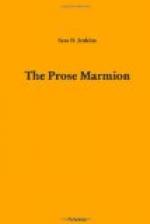“Welcome to Norham,
Marmion!
Stout heart and open
hand!
Thou flower of English
land!”
Two pursuivants stood at the entrance to the donjon, and hailed the guest as Lord of Fontenaye, of Lutterward, Scrivelbaye, of “Tamworth tower and town.” To requite their courtesy, Marmion, as he alighted, hung about the neck of each a chain of twelve marks.
“Largesse, largesse, knight of the crest of gold!” cried the heralds, in acknowledgment of the bounty received;
“’A blazon’d
shield in battle won,
Ne’er
guarded heart so bold.’”
As they marshalled him to the castle hall, the guests stood aside, and again the trumpets flourished, and the heralds cried:
“’Room, lordlings,
room for Lord Marmion,
With
the crest and helm of gold!
Full well we know
the trophies won
In
the lists at Cottiswold:
There, vainly
Ralph de Wilton strove
’Gainst
Marmion’s force to stand;
To him he lost
his lady-love,
And
to the King his land.
Ourselves beheld
the listed field,
A
sight both sad and fair;
We saw Lord Marmion
pierce the shield,
And
saw the saddle bare;
We saw the victor
win the crest
He
wears with worthy pride;
And on the gibbet-tree,
reversed,
His
foeman’s scutcheon tied.
Place, nobles,
for the Falcon-Knight!
Room,
room, ye gentles gay,
For him who conquered
in the right,
Marmion
of Fontenaye!’”
As the welcome died away, forth stepped Sir Hugh, lord of the castle. He led his visitor to the raised dais and placed him in the seat of honor, while a northern harper chanted a rude hymn. The ear of Marmion could scarcely brook the barbarous sound, yet much he praised, well knowing that,
“Lady’s suit,
and minstrel’s strain,
By knight should ne’er
be heard in vain.”
As the weird strains died away, the host pressed the English lord to bide long as a guest, promising rest for horse, and refreshment and pleasure for man, with many a joust, or feat at arms, for those who wished to learn northern ways.
At this the brow of Marmion grew dark and stern. Sir Hugh marked the changed look, and pouring out a bowl of sparkling wine, said:
“’Now pledge me
here, Lord Marmion:
But
first I pray thee fair,
Where hast thou
left that page of thine,
Whose
beauty was so rare?
When last in Raby
towers we met,
The
boy I closely eyed,
And often marked
his cheeks were wet
With
tears he fain would hide.’”
Lord Marmion ill concealed his rising anger, yet he made a calm reply.
“The lad was too frail to endure the northern climate, and I have left him at Lindisfarne. May I ask, Lord Heron, why the lady of the castle disdains to grace the hall to-day? Is it because Marmion of Fontenaye is present?”




